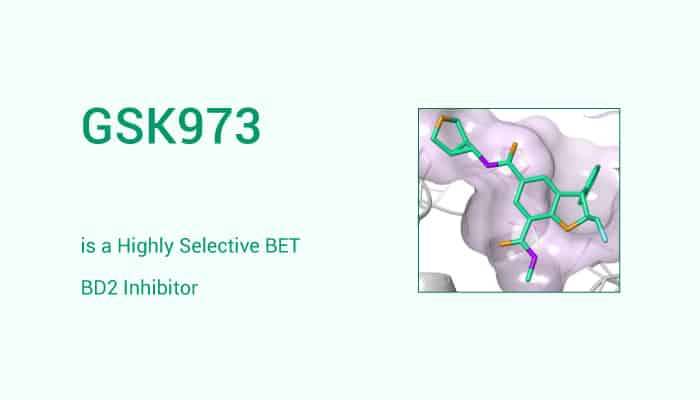The bromodomain and extra-terminal (BET) family of proteins are epigenetic readers of chromatin. The two tandem bromodomains (BD1 and BD2) of each of the four proteins (BRD2, 3, 4, and T) recognize and bind to specific acetylated-lysine residues of histone tails and non-histone proteins. They play a major role in the regulation of gene transcription. Pan-BET inhibitors show efficacy in a number of pre-clinical in vitro and in vivo models with several molecules progressed into the clinic. These inhibitors interact equipotently with the eight bromodomains of the BET family of proteins. In this study, GSK973 is a highly selective, orally bioavailable inhibitor of the BD2s of the BET family. It has a pIC50 of 7.8 and a pKd of 8.7 for BRD4 BD2. GSK973 displays a 1600-fold selectivity for BRD4 BD2 over BRD4 BD1.

GSK973 is a highly selective inhibitor of the second bromodomains of the BET proteins. It also shows good potency against BRD2 BD2, BRD3 BD2, and BRDT BD2 (pIC50=7.4~7.8; pKd=8.3~8.5). GSK973 is a drug-like inhibitor with exceptional potency and selectivity. Its in vitro profile and good pharmacokinetics in pre-clinical species make it a useful tool for further probing the separate contributions of the BDs to BET-associated functional phenotypes. In addition, the enantiomer of GSK973, with BD1/BD2 pIC50s of <4.3 and 5.1 represents a good negative control.
In conclusion, GSK973 is a highly selective, orally bioavailable inhibitor of the BD2s (second bromodomains) of the BET family. It shows good potency against BRD2 BD2, BRD3 BD2, and BRDT BD2. GSK973 is a useful tool for further probing the separate contributions of the BDs to BET-associated functional phenotypes.
Reference:
Preston A, et al. ACS Med Chem Lett. 2020;11(8):1581-1587. Published 2020 Jul 6.